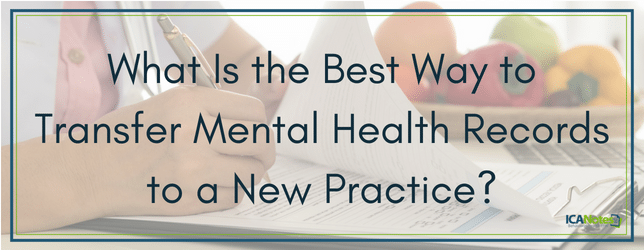What Is the Best Way to Transfer Mental Health Records to a New Practice?
The single best way for behavioral health professionals to transfer electronic health records of their patients is to do so in a manner that best complies with HIPAA regulations and privacy rules. That said, the HIPAA laws for transferring electronic health records can result in professionals feeling like they have more questions than answers when certain real-life circumstances arise.
For this reason, let’s look at a couple of instances where behavioral health professionals can feel uncertain as to the best method to transfer a patient’s mental health records — and, of course, remain HIPAA-compliant.
Transferring Mental Health Records
As you’re probably aware, the final rule of HIPAA was released in the beginning of 2013. It reduced the time a mental health provider has to properly respond to a patient’s request for his or her medical record to be transferred to 30 days. Along with the pressure this brings to an already busy practice’s schedule, providers may have questions regarding the level of security needed for the transfer of electronic health records, as well as the proper response to a patient who returns multiple times for medical record transfers.
Here’s a closer look at both instances with HIPAA rules serving as a best practice guide.
Best Practice for EHR Transfers
If you maintain electronic health records, do you know what your responsibilities are when a patient asks for his or her record to be transferred? Here’s what you need to know.
It’s your responsibility to provide a copy of the requested medical record in one readable electronic format such as a disc or an encrypted/secure email. It can also be via a secure online patient portal like the one ICANotes provides. The electronic format you decide upon is up to you, and you don’t have to purchase specific hardware or software to accommodate a particular patient’s request.
Moreover, if patients request that you transfer their records to regular flash drives or send them via unencrypted email, you may comply with those requests after advising them of the security risks involved. While it’s not a rule, you’re strongly advised to obtain patients’ signed statements acknowledging that they’ve been fully warned of the privacy risks. On the other hand, you have the right to refuse these patients’ requests in these instances and to instead supply them with a hard copy of their records.
Multiple Mental Health Transfer Requests From the Same Patient
Let’s say you complied with a patient’s request to transfer his or her mental health record to a second practice — but later, you receive another request when that same patient moves onto a third practice. Are you under any obligation to provide another copy of the patient’s mental health record, knowing that it’s the second practice’s responsibility to transfer the patient’s complete mental health record to the third practice?
The answer here is twofold, but in both instances, you’re best served by upholding your own HIPAA-compliance.
First, although you properly transferred your patient’s mental health record to the second practice, do you know what happened to it once it was received? Of course, you don’t. Many practices are struggling to keep up with advancements in electronic health records, so old and new records might not be integrated. At the same time, the second practice might have misplaced or accidentally destroyed your record simply due to an overwhelming caseload or a mistake.
Second, while you could make a call to the second practice and ask why your former patient’s mental health record isn’t complete, do you really have the time for endless rounds of phone calls, especially when the 30-day clock for properly responding to your former patient’s request is ticking? You likely don’t.
That’s why in all instances, it’s best to stay HIPAA-compliant with timely management, integration and transfer of your patients’ mental health records. For this reason, ICANotes was specifically developed to be the most robust behavioral health EHR management tool on the market. For a free trial or live demo, contact ICANotes today.

